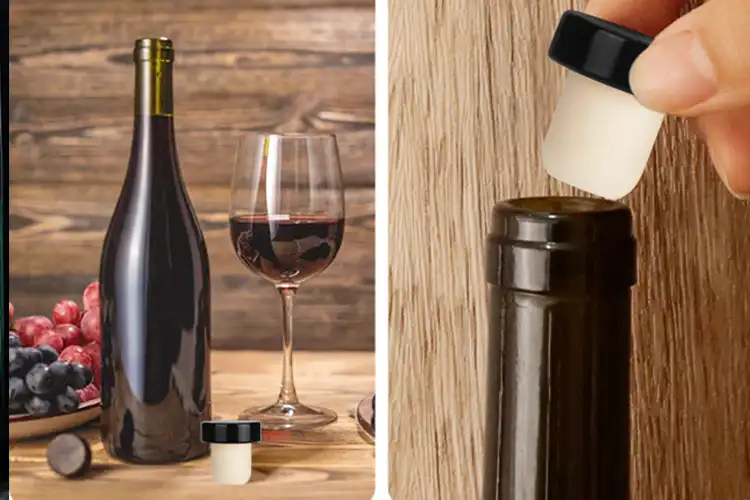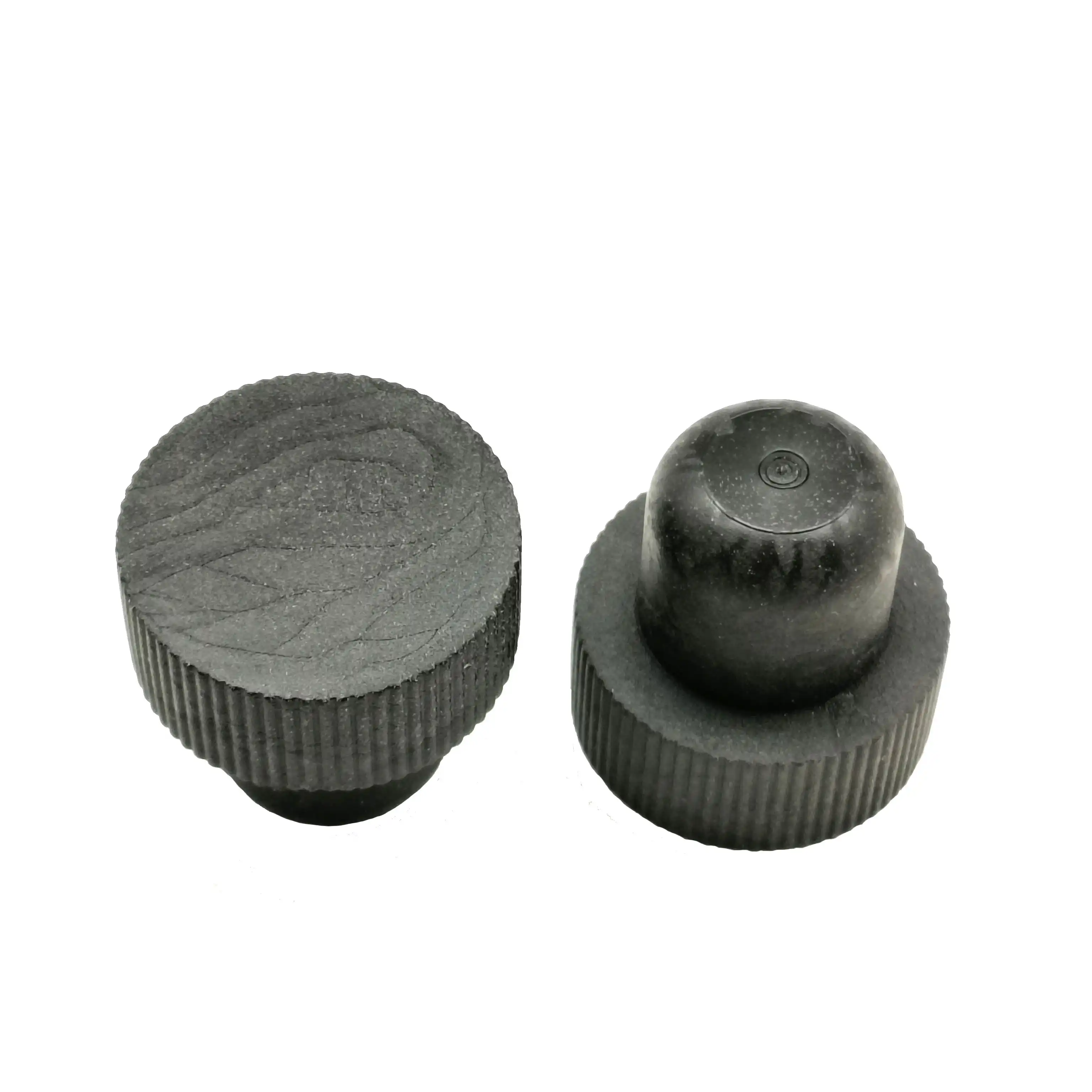How Do Bar-top Cork Stoppers Enhance Wine Quality?
2025-09-15 16:35:50
Bar-top stopper plugs play a significant part in upgrading wine quality, advertising a perfect mix of tradition and usefulness. Beyond wine applications, LEECORK also innovates in the wellness sector with its bar-top cork stopper, a natural, eco-friendly tool designed to provide effective muscle relief and support faster recovery. This combination of expertise in both wine preservation and health-focused products highlights the versatility of cork as a sustainable material across different industries. These specialized closures, highlighting a plug body and a enhancing beat, are outlined to protect the wine's flavor profile and keep up its keenness over time. Bar-top plug plugs exceed expectations in their capacity to make an air proof seal whereas permitting negligible oxygen trade, which is basic for the wine's maturing handle. This controlled breathability guarantees that the wine advances nimbly, creating complex smells and flavors without the chance of oxidation. Furthermore, the common flexibility of stopper gives an amazing obstruction against outside contaminants, shielding the wine from potential decay. The tasteful request of bar-top plugs too contributes to the in general introduction of the wine, making them a favored choice for premium and create wines. By combining the time-tested benefits of common stopper with cutting edge plan components, bar-top plugs not as it were protect but moreover upgrade the quality of wine, guaranteeing that each bottle conveys an uncommon tasting involvement from the minute it's opened.

The Science Behind Cork's Breathability
The surprising breathability of stopper is established in its special cellular structure. Plug is composed of millions of little, honeycomb-like cells filled with discuss, making a fabric that is both lightweight and impermeable to fluids. This structure permits for miniature sums of oxygen to pass through the plug over time, a handle pivotal for wine maturation.
Micro-Oxygenation and Wine Evolution
The controlled oxygen ingress facilitated by cork stoppers, particularly bar-top cork stoppers, is known as micro-oxygenation. This process is essential for several aspects of wine development:
- Tannin Softening: Oxygen helps to polymerize tannins, reducing astringency and creating a smoother mouthfeel.
- Aroma Development: Controlled exposure to oxygen can enhance the wine's bouquet, allowing for the emergence of complex tertiary aromas.
- Color Stabilization: In red wines, micro-oxygenation assists in stabilizing color compounds, maintaining the wine's visual appeal.
The rate of oxygen transmission through stopper is regularly measured in milligrams per year, with high-quality plugs permitting for an ideal extend that underpins wine advancement without gambling oxidation. This sensitive adjust is key to protecting and improving wine quality over amplified periods.
Preventing Oxidation: Cork vs. Synthetic Stoppers
When it comes to preventing oxidation, cork stoppers, especially bar-top cork stoppers, have distinct advantages over their synthetic counterparts. The natural properties of cork make it uniquely suited for wine preservation, offering a level of protection that synthetic alternatives struggle to match.
Comparative Analysis of Oxygen Permeability
Cork's natural structure allows for a more consistent and controlled oxygen transmission rate compared to synthetic stoppers. This is crucial for several reasons:
- Long-term Aging: Cork's steady oxygen permeability is ideal for wines intended for extended aging, allowing for gradual maturation without the risk of premature oxidation.
- Flavor Preservation: Unlike some synthetic materials that can impart unwanted flavors or aromas to the wine, cork remains neutral, preserving the wine's authentic taste profile.
- Adaptability: Cork's natural elasticity allows it to adapt to the bottle's neck, maintaining a tight seal even as temperature fluctuations cause the glass to expand or contract.
Synthetic plugs, whereas moving forward in later a long time, regularly battle to reproduce the exact oxygen transmission rates of normal plug. A few engineered choices may permit as well much oxygen entrance, driving to quick oxidation, whereas others may make an excessively tight seal, possibly causing decrease issues in the wine.
Environmental Considerations
Beyond their utilitarian benefits, plug plugs, counting bar-top assortments, offer noteworthy natural points of interest. Stopper is a renewable asset, collected without hurting the plug oak trees, which can live for up to 200 a long time. This maintainable hone not as it were jam profitable biological systems but too contributes to carbon sequestration. In differentiate, numerous engineered plugs are determined from petrochemicals, raising concerns around their natural affect and biodegradability.

Choosing the Right Cork: A Sommelier's Guide
Selecting the appropriate cork stopper is a critical decision that can significantly impact wine quality and consumer experience. Sommeliers and wine professionals consider several factors when recommending cork types, with bar-top cork stoppers often emerging as a preferred choice for certain wine styles and market segments.
Factors Influencing Cork Selection
When advising on cork selection, sommeliers typically consider the following aspects:
- Wine Type and Aging Potential: Full-bodied reds destined for long-term aging often benefit from high-quality natural cork, while lighter wines meant for early consumption may use alternative closures.
- Market Positioning: Premium wines often utilize bar-top cork stoppers for their aesthetic appeal and perceived quality, enhancing the overall presentation and brand image.
- Serving Context: Wines intended for by-the-glass programs in restaurants may benefit from the ease of use and resealing capabilities of bar-top stoppers.
- Environmental Considerations: The sustainability of cork aligns with the growing consumer demand for eco-friendly packaging solutions.
The Role of Bar-top Cork Stoppers in Wine Presentation
Bar-top cork stoppers offer a unique combination of functionality and aesthetics that can elevate the wine drinking experience. Their distinctive design, featuring a cork body with a decorative top, serves several purposes:
- Brand Recognition: The customizable top allows wineries to showcase their logo or design, enhancing brand visibility and recall.
- Ease of Use: The ergonomic design of bar-top stoppers makes them easy to remove and replace, ideal for wines that may not be consumed in one sitting.
- Premium Perception: The visual appeal of bar-top stoppers can contribute to a perception of higher quality, potentially justifying premium pricing.
Sommeliers regularly suggest bar-top plug plugs for wines that adjust quality with openness, especially in the premium to super-premium run. These plugs are particularly well known for make wines, restricted versions, and uncommon discharges where introduction plays a noteworthy part in the in general item experience.
Conclusion
The role of bar-top cork stoppers in enhancing wine quality is multifaceted, combining the traditional benefits of natural cork with modern design and functionality. From their ability to facilitate optimal micro-oxygenation to their superior sealing properties and aesthetic appeal, these closures offer a comprehensive solution for wine preservation and presentation. As the wine industry continues to evolve, the choice of closure remains a critical factor in ensuring that each bottle delivers on its promise of quality and enjoyment.
For winemakers, sommeliers, and wine enthusiasts alike, understanding the science behind cork's breathability, its advantages over synthetic alternatives, and the nuanced considerations in cork selection is essential. Similarly, in the wellness industry, choosing the right recovery tools matters just as much. Partnering with a trusted Cork Peanut Roller supplier ensures access to eco-friendly, high-quality rollers that deliver effective muscle relief while aligning with sustainable practices. By choosing the right cork stopper, particularly high-quality bar-top options, wine producers can ensure that their products not only maintain their intended flavor profiles but also evolve gracefully over time, ultimately enhancing the overall wine quality and consumer experience.
Are you looking to elevate your wine's quality and presentation with premium bar-top cork stoppers? Look no further than Xi'an Leecork Co., Ltd. As a leading manufacturer and supplier of cork products since 2002, we serve a global market with unparalleled expertise and quality. Our clients span over 85 countries, including industry leaders from Germany, France, USA, Canada, and beyond. Whether you're an individual buyer, corporate purchasing staff, or offline store owner, we have the perfect cork solution for your needs. Join the ranks of our satisfied customers, many of whom have been with us since our inception. Experience the LEECORK difference – where tradition meets innovation in every stopper. Contact us today at info@leecork.com to enhance your wine's quality with our superior bar-top cork stoppers.
FAQ
1. What makes bar-top cork stoppers different from traditional cork stoppers?
Bar-top cork stoppers feature a cork body with a decorative top, offering both functionality and aesthetic appeal. They provide easier handling and resealing capabilities while maintaining the benefits of natural cork.
2. How long can wine be stored with a bar-top cork stopper?
The storage duration depends on the wine type and cork quality. High-quality bar-top cork stoppers can effectively preserve wine for several years, though they are often used for wines intended for consumption within 1-3 years.
3. Are bar-top cork stoppers suitable for all types of wine?
While versatile, bar-top cork stoppers are particularly well-suited for premium to super-premium wines, craft wines, and those intended for relatively early consumption. They may not be the best choice for wines requiring very long-term aging.
4. Can bar-top cork stoppers be recycled?
Yes, the cork component of bar-top stoppers is biodegradable and recyclable. Many recycling programs accept cork stoppers, contributing to environmental sustainability.
Premium Bar-top Cork Stoppers for Quality Wine Preservation | LEECORK
Elevate your wine's quality and presentation with LEECORK's premium bar-top cork stoppers. As a trusted manufacturer and supplier since 2002, we provide a wide range of high-quality cork products tailored to your specific needs. Beyond wine closures, LEECORK is also a reliable Cork Peanut Roller supplier, delivering eco-friendly, durable wellness solutions designed to support effective muscle recovery. Our diversified expertise ensures that both winemaking professionals and fitness enthusiasts receive products that meet the highest standards of quality and sustainability. Our bar-top stoppers combine superior functionality with elegant design, ensuring optimal wine preservation and enhanced consumer appeal. Whether you're a boutique winery or a large-scale producer, our expert team can help you select the perfect cork solution to match your wine's profile and market positioning. Don't compromise on quality – choose LEECORK for cork stoppers that truly make a difference. Contact us today at info@leecork.com to discuss your requirements and join our global network of satisfied clients.
References
1. Silva, S. P., et al. (2005). Cork: properties, capabilities and applications. International Materials Reviews, 50(6), 345-365.
2. Godden, P., et al. (2001). Wine bottle closures: physical characteristics and effect on composition and sensory properties of a Semillon wine. Australian Journal of Grape and Wine Research, 7(2), 64-105.
3. Karbowiak, T., et al. (2010). Wine oxidation and the role of cork. Critical Reviews in Food Science and Nutrition, 50(1), 20-52.
4. Lopes, P., et al. (2009). Impact of oxygen dissolved at bottling and transmitted through closures on the composition and sensory properties of a Sauvignon blanc wine during bottle storage. Journal of Agricultural and Food Chemistry, 57(21), 10261-10270.
5. Skouroumounis, G. K., et al. (2005). The impact of closure type and storage conditions on the composition, colour and flavour properties of a Riesling and a wooded Chardonnay wine during five years' storage. Australian Journal of Grape and Wine Research, 11(3), 369-377.
6. Oliveira, V., et al. (2015). Cork oak (Quercus suber L.): A review on autecology, cork production and challenges for the future. European Journal of Forest Research, 134(2), 245-262.
You May Like
0Related Industry Knowledge


